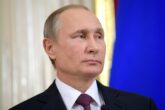June 26, 2019
How to Address the Greater Russia-China Alignment
The world’s leaders will gather this week for the G20 Summit in Japan. All eyes will be on President Donald Trump’s highly anticipated meetings with Chinese president Xi Jinping and Russian president Vladimir Putin. But as observers look for indicators of how relations between the United States and its strategic rivals will evolve, another less appreciated dynamic is progressing. Tensions between the United States and both Russia and China continue to run high; meanwhile, Xi and Putin are drawing closer. The two leaders have been strengthening ties in ways that will make it more difficult for Washington to compete with either country. In this great-power triangle, Trump increasingly looks like the odd man out.
It’s not that Trump has written off efforts to improve relations with Putin and Xi; to the contrary. Trump has shown an affinity for both strongmen and regularly speaks of his desire to befriend them. But despite Trump’s rhetoric, his administration’s policies—a simultaneous trade war with China and ever-mounting sanctions on Russia—have pushed Putin and Xi closer together. Putin has called Xi his “best and bosom friend” and Xi just celebrated his sixty-sixth birthday with Putin. The camaraderie between the two leaders has been a key driver of the growing cooperation between the two countries.
At the heart of the alignment between China and Russia is their shared interest in undermining U.S. influence globally. The two countries are united in their mutual displeasure with the United States and the U.S.-dominated international order that they feel disadvantages them. But while Russia and China may have initially banded together in discontent, their repeated engagement on areas of mutual interest is fostering a deeper and enduring partnership. It is clear that China will pose the greatest challenge to U.S. interests for the foreseeable future, but Beijing’s increasing collaboration with Moscow will amplify that challenge.
Read the full article in The National Interest.
More from CNAS
-
Trump ‘Humiliated’ as Putin Sends Clear Message That He Doesn’t Care About US
"Putin is not playing ball." Putin's Palm Sunday attack on Sumy is "embarrassing for the White House" as it comes just days after Steve Witkoff met with the Kremlin, says adju...
By Jim Townsend
-
The Hidden Past and Uncertain Future of the U.S. and Ukraine with Celeste Wallander
Under the Trump administration, U.S. support for Ukraine is no longer guaranteed. President Trump's pause on aid and intelligence to Ukraine in March may have been brief, but ...
By Andrea Kendall-Taylor, Jim Townsend & Celeste Wallander
-
Is Russia Under Pressure?
Since 2014, the United States and its allies have provided increasing military support to Ukraine while imposing more and tougher economic sanctions on Russia, especially sinc...
By Jeffrey Edmonds
-
Sharper: Russia and the Axis of Upheaval
Russia’s 2022 invasion of Ukraine served as a dramatic catalyst for strengthening the global axis of upheaval. To sustain its war effort, Russia has imported Iranian weapons a...
By Charles Horn




